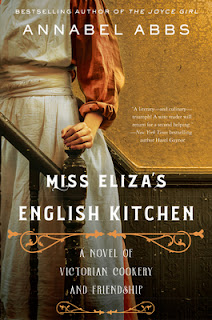The Secret History of Home Economics: How Trailblazing Women Harnessed the Power of Home and Changed the Way We Live by Danielle Dreilinger is the March pick for my New Jersey book club. (It's the week of my daughter's visit so I'm not even sure I'll be able to join in the meeting. Boo!)
Quite fascinating to read this book while I finished listening to Miss Eliza's English Kitchen. It was interesting to compare and contrast what I was hearing about cooking, kitchens, employment opportunities and the like while having both books in my brain. It made me think a lot about the opportunities for women and how limited they were back in Miss Eliza's time and even after.
Even after reading this, I'm still not 100% certain about how they coined the phrase "home economics." Skills were being taught to women that they would be able to use to run an efficient, happy home. But it seems the area of study was mostly a way for girls to study something more rigorous than "girls' topics" and to prepare for pretty substantial careers, some of which had not yet even been created.
It was a bit eye-opening to read about what home economics was like before my time - and after. I was a student at the time when home economics was in its most tumultuous period. Cooking and sewing classes - for girls only - were on their way out. But not quite.
I enjoyed reading the book and hope that I'll get to discuss it. But... and there's a big but. Towards the end of the book, Dreilinger inserted herself into the narrative. That would have been fine... had she done that all along. It was confusing as to why she inserted herself into the present day narrative. It's not like she's a home economist. Or is she? And it made me wonder what was the purpose of her book? Did the purpose of her book change over the time she was writing it? By the time I finished my reading, I felt that I needed the answers to those questions. Her observations about home economics during a pandemic were spot-on, but it made me feel as though some earlier parts of the book should have been re-written.
I also felt that the book jumped around. It wasn't chronological. It didn't focus on one home economist at a time. It didn't focus on one theme at a time. That made some of the narrative confusing to me, trying to place why a home economist was important and during which time period.
All in all, the book gave me a lot to think about. And I love a book that really makes me think.












